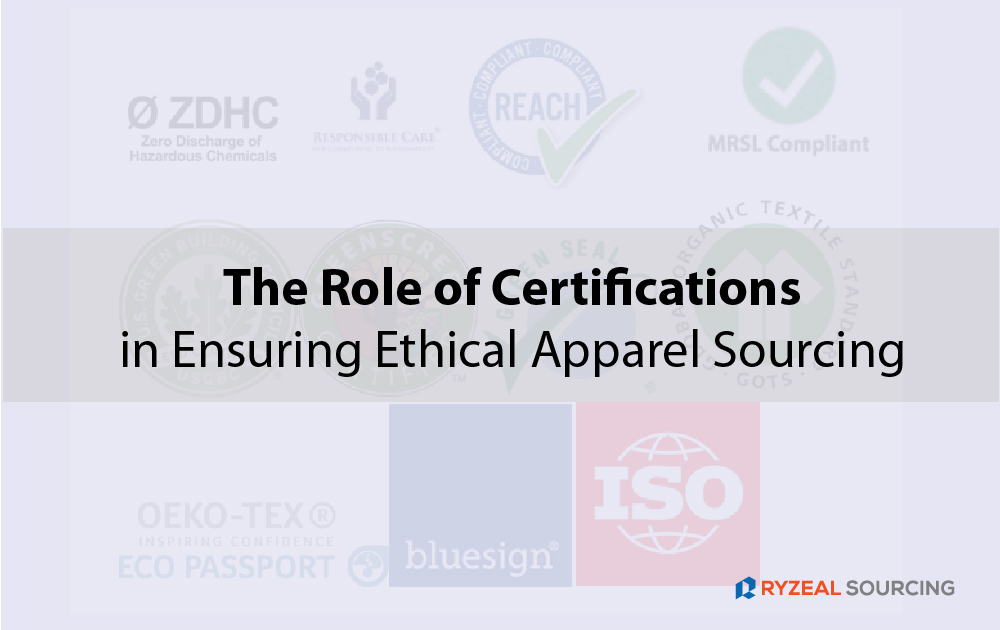Introduction:
In today’s socially conscious consumer landscape, ethical sourcing practices are paramount for apparel brands and retailers. Certifications play a crucial role in verifying and ensuring that apparel sourcing processes adhere to ethical standards, encompassing factors such as fair labor practices, environmental sustainability, and supply chain transparency. In this comprehensive guide, we’ll delve into the significance of certifications in ethical apparel sourcing and explore how they contribute to fostering responsible and sustainable practices in the fashion industry.
Fair Trade Certification: Fair Trade certification guarantees that apparel products are sourced from suppliers who adhere to fair labor practices, ensuring that workers receive fair wages, safe working conditions, and other social benefits. Brands certified by organizations like Fair Trade USA or Fairtrade International commit to supporting small-scale farmers and garment workers in developing countries, empowering them economically and socially. For example, Patagonia’s Fair Trade Certified™ apparel line ensures fair compensation and worker welfare throughout the supply chain, promoting social equity and dignity for all stakeholders.
Global Organic Textile Standard (GOTS): The Global Organic Textile Standard (GOTS) certification verifies that apparel products are made from organic fibers and produced using environmentally and socially responsible manufacturing processes. GOTS certification encompasses strict criteria for organic farming, chemical use, and labor conditions, ensuring that textiles are free from harmful chemicals and produced with minimal environmental impact. Brands like EILEEN FISHER and prAna prioritize GOTS-certified materials in their apparel collections, demonstrating their commitment to sustainability and eco-conscious sourcing practices.
OEKO-TEX Standard 100: The OEKO-TEX Standard 100 certification verifies that apparel products are free from harmful substances and comply with strict safety and environmental standards. OEKO-TEX certification ensures that textiles are tested for hazardous chemicals and substances, such as heavy metals, formaldehyde, and azo dyes, which can pose risks to human health and the environment. Brands like H&M and Zara prioritize OEKO-TEX certified materials in their apparel production, providing consumers with confidence in the safety and quality of their garments.
Sustainable Apparel Coalition (SAC) Higg Index: The Sustainable Apparel Coalition (SAC) Higg Index is a comprehensive tool that assesses the environmental and social impact of apparel products and supply chains. Brands and manufacturers use the Higg Index to measure and benchmark their sustainability performance across various aspects, including materials, energy usage, water management, and labor practices. By participating in the SAC Higg Index, companies like Levi Strauss & Co. and Nike can identify areas for improvement and drive positive change towards more sustainable sourcing practices.
WRAP Certification (Worldwide Responsible Accredited Production): WRAP certification validates that apparel manufacturers comply with ethical labor standards and workplace conditions, including child labor avoidance, fair wages, and health and safety regulations. Brands sourcing from WRAP-certified factories demonstrate their commitment to responsible sourcing and corporate social responsibility. For example, Gap Inc. has partnered with WRAP-certified suppliers to ensure ethical labor practices and social compliance in its global supply chain, promoting worker welfare and human rights.
Better Cotton Initiative (BCI): The Better Cotton Initiative (BCI) promotes sustainable cotton production practices, aiming to minimize environmental impact and improve livelihoods for cotton farmers worldwide. BCI certification ensures that cotton is sourced from farms that adhere to principles of water stewardship, biodiversity conservation, and community engagement. Brands like IKEA and Adidas support BCI-certified cotton initiatives in their apparel and home textile products, contributing to more sustainable and responsible cotton sourcing practices.
Fair Wear Foundation (FWF): The Fair Wear Foundation (FWF) is an independent nonprofit organization that works to improve labor conditions in the global garment industry. Brands partnering with FWF commit to implementing ethical sourcing practices, transparency, and accountability throughout their supply chains. By undergoing regular audits and assessments, FWF member brands like C&A and Jack Wolfskin demonstrate their dedication to promoting fair labor practices and ensuring worker rights are upheld in apparel manufacturing.
Rainforest Alliance Certification: The Rainforest Alliance Certification verifies that apparel products are sourced from farms and factories that adhere to sustainable agriculture and forestry practices, biodiversity conservation, and community development. Brands certified by the Rainforest Alliance support responsible sourcing of materials like cotton, wool, and rayon, contributing to forest conservation and ecosystem preservation. For example, outdoor apparel brands like Patagonia and The North Face prioritize Rainforest Alliance certified materials in their product lines, aligning with their commitments to environmental stewardship and conservation.
Carbon Trust Certification: Carbon Trust certification certifies that apparel brands and manufacturers have implemented measures to reduce carbon emissions and minimize their environmental footprint. Through carbon footprint assessments and carbon reduction initiatives, certified companies demonstrate their commitment to addressing climate change and sustainability challenges. Brands like Stella McCartney and Timberland have obtained Carbon Trust certification for their sustainability efforts, showcasing their commitment to reducing greenhouse gas emissions and combating climate change.
B Corp Certification: B Corp certification recognizes companies that meet rigorous standards of social and environmental performance, accountability, and transparency. Apparel brands certified as B Corps prioritize ethical sourcing, sustainable practices, and social responsibility in their business operations. By becoming B Corp certified, companies like Allbirds and Outerknown demonstrate their commitment to using business as a force for good, promoting positive social and environmental impacts throughout the apparel supply chain.
Conclusion:
Certifications play a pivotal role in ensuring ethical apparel sourcing by providing consumers with transparency, accountability, and assurance that products are produced in a socially and environmentally responsible manner. From fair trade and organic certifications to sustainability and labor compliance standards, certifications empower consumers to make informed choices and support brands that prioritize ethical sourcing practices. As the fashion industry continues to evolve, certifications will remain essential tools for promoting sustainability, transparency, and integrity in apparel sourcing.

